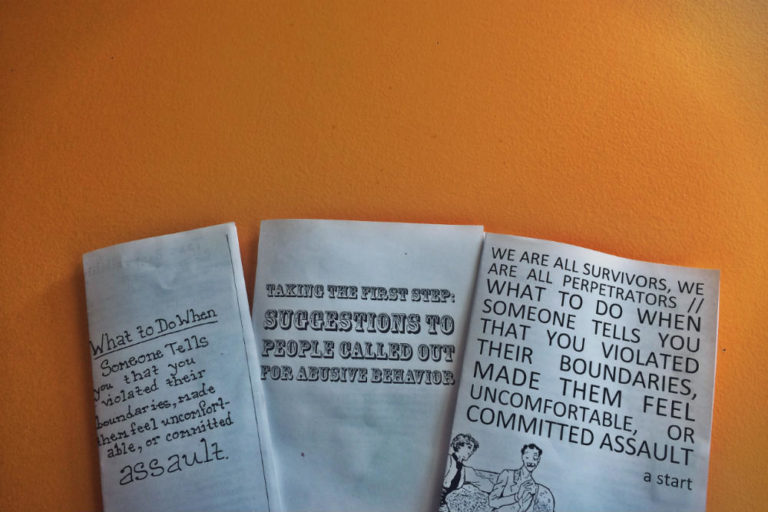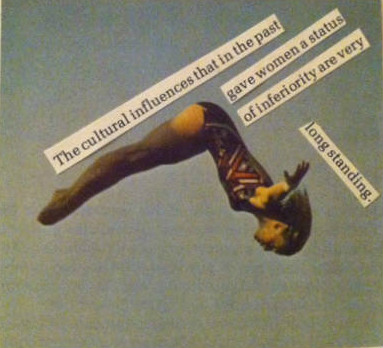Five ways Ghomeshi reveals rape culture
Written by Nick Montgomery, first published at Cultivating alternatives.
Most people are tired of Ghomeshi by now, but hopefully all this leads to more engagement in feminism, and an attempt to challenge rape culture and nurture alternatives. Since publishing this, I wrote a second piece about this here: Alternatives to rape culture begin with feminism
There is a frenzy of activity to find “the facts” about Jian Ghomeshi, the allegations against him, and the women who have shared their experiences. Thousands of fans have flocked to defend Ghomeshi and deride his accusers as vindictive slanderers.
Others have expressed their moral outrage that Ghomeshi could be such a monster. Others have called for us to wait until there are “more facts.” These are consistent patterns that arise when discussing rape, sexual assault, and gendered violence. They are some of the  patterns of rape culture.
patterns of rape culture.
As Jane Kirby explains, rape culture is “anything that normalizes unwanted, nonconsensual sex. In other words, rape culture is anything that makes rape seem like it is not really rape.” It gets disseminatedthrough jokes, TV, music, advertising, legal jargon, laws, words, and imagery, that make violence against women and sexual coercion seem so normal that people think rape is inevitable.” There is also a pervasive idea that “actual rape” is isolated and exceptional. Responses to the allegations against Ghomeshi (including his own) have reinforced rape culture in at least five subtle and not-so-subtle ways:
1. Promoting sympathy for perpetrators and their reputations
In his recent statement, Ghomeshi says that a freelance writer teamed up with a jealous ex in a conspiracy to ruin his reputation. His fans and defenders have reiterated his argument, framing it as a malicious attempt to slander Ghomeshi.
@jianghomeshi So sorry for your loss.You’reantastic broadcaster. Don’t let these motherfuckers get you down. Get your ass to the States.
— Norm Macdonald (@normmacdonald) October 27, 2014
This is a consistent pattern of rape culture: the promotion of worry and sympathy for those accused of sexual assault. It shifts the focus toward doubt and disbelief, toward how unfortunate it would be if the accusations were untrue. It centers perpetrators as (maybe? possibly? probably?) hapless victims of vindictive slander.
2. Promoting victim-blaming and suspicion
Ghomeshi himself calls this a “campaign of false allegations pursued by a jilted ex girlfriend” Some of the most violent patterns of rape culture are made visible by the slew of misogynist attacks on women who come forward. This is one of the most consistent and insidious patterns of rape culture. Anna North writes that:
each of the women accusing Ghomeshi cite the case of Carla Ciccone as a reason they desire anonymity. Last year Ciccone wrote an article for the website XOJane about a ‘bad date’ with an unidentified, very popular Canadian radio host whom readers speculated to be Ghomeshi.
In the days that followed, Ciccone received hundreds of abusive messages and threats. An online video calling her a ‘scumbag of the Internet’ has been viewed over 397,000 times.
Those who speak up about sexual harassment or violence have long been subject to public scrutiny and criticism. But an onslaught of online abuse and threats has become a strikingly common response to women’s public statements — see for instance the threats Anita Sarkeesian and others have received when they speak publicly about misogyny in video games.
Blogger Elizabeth Hawksworth unpacks this eloquently:
What I want to talk about is the reactions that I’ve been seeing to his statement. A lot of people have been giving Ghomeshi the benefit of the doubt while full-on accusing the woman of ruining his career. Without knowing anything but what Ghomeshi has told us, people on Twitter and Facebook have been gleefully maligning her without taking into account that maybe there’s more to the story, here… Women everywhere are sexually assaulted by men in power. Many don’t bother to speak up because of reactions and consequences like this: Ghomeshi is a man in power and he is also well liked and well known. Chances are, he will be almost universally believed, while she will be accused of lying to get something from him. And while there is an extremely small percentage of women who do accuse men of sexual abuse in order to get something from them, the majority of women don’t. The majority of women speak up because they want justice. And right now, we don’t know what the real story is – but as someone who never spoke up when a man in power put me through hell, for a variety of reasons – I believe her until further notice.
3. Remaining neutral and waiting for ‘all the facts’
Many have responded to this debate by calling for sobriety and patience. Toronto Star columnist Vinay Menon—while making sure not to condone the “shocking allegations”—expressed regret that “many have already picked sides” before “all the facts” are known. Menon reminds his readers that Ghomeshi is (legally) innocent until proven guilty. We should approach sexual assault as judges would, presiding over a criminal trial. But there is no criminal trial here; no one is pressing charges. What matters isn’t whether we decide the Ghomeshi is guilty, but the ways we talk about the whole thing, and the implications of that.
The focus on innocent-until-proven-guilty shifts the onus back on survivors to prove that a sexual assault ‘really’ happened. ‘Picking sides’ (or supporting survivors?) is cast as irrational and hasty, with neutrality held up as the ideal. Due in part to this tendency, survivors of sexual assault don’t think they’ll be believed, or they fear that ‘concrete proof’ will be demanded of them—even by friends and family—and often they’re right. As Ruth Davenport writes:
Women, it seems, must always have an agenda. We don’t actually slap scarlet letters on them anymore, but thanks to the internet, women who accuse a man of any kind of misbehaviour risk having not only their identities exposed and publicized, but also an eternal water-torture drip-drip-drip of daily character assassination.
Refusing to file a formal complaint – the decision made by approximately nine out of every 10 sexual assault victims isn’t a case of modesty or manipulation – it’s simple survival. And modern rape culture is thriving on it.
This focus on “due process” is linked to policing, courts, and incarceration. It naturalizes these systems as the only way of responding to sexual assault. As Vikki Law recently argued, this carceral mindset justifies the expansion of policing and prisons (especially in poor communities of colour), and discourages grassroots, community-based responses and long-term organizing against gender-based violence. This is not to say that survivors shouldn’t report rape as a crime, or that supporters shouldn’t support them doing so. The point is that this legalistic mindset gets in the way of supporting survivors, unlearning rape culture, and organizing to dismantle it.
4. Casting the concept of rape culture as alarmist, conspiratorial, or crazy
A few months ago Jian Ghomeshi actually hosted a “debate,” about whether rape culture is “helpful or even accurate,” in which Heather MacDonald of the Manhattan Institute denied the existence of rape culture, claimed that drinking is the reason for sexual assault, and blaming women for being assaulted. MacDonald’s opponent, Lise Gotell, sounded shocked that she was put in a position where she had to explain things like “drinking doesn’t cause rape, it’s the decisions of rapists that cause rape.” By constructing a debate around whether rape culture ‘actually’ exists, and legitimizing its detractors, Ghomeshi and the CBC framed rape culture as a suspicious idea, creating barriers to understanding rape culture and the ways it can be named, challenged, and dismantled.
This year, the wake of campus sexual assaults and misogynist violence at Canadian universities led to broader discussions about rape culture on campuses, spearheaded by feminists, and this elicited an anti-feminist backlash. Detractors have suggested that the concept of rape culture is a fanatical misunderstanding of culture and norms. Quotation marks are magical. In the hands of its anti-feminist critics, rape culture becomes “rape culture”—a strange and distorted view of reality, founded on irrationality and conspiracy. The same sentiments are circulating now, in relation to the recent scandal. Reactionaries understand this tactic all too well, using it to frame issues like climate change: by turning it into a question of legitimate debate (“so-called climate change”), they’ve already scored a victory, because they derail any conversation about collective responses to the problem.
5. Constructing rapists as inhuman monsters
Part of rape culture is the persistent tendency to cast perpetrators of sexual assault as unredeemable monsters, and rape as an exceptional event. The frenzy surrounding Ghomeshi reflects this: it is dramatic and revelatory, antagonistic and isolated. Either Ghomeshi a guilty monster or a hapless victim of slander. Sexual assault is terrible, but it’s also pervasive. As Jane Kirby explains:
Young men are taught that rape means jumping out of the bushes, attacking a stranger, and violently forcing her to have sex with him. While this can be true, they often don’t know that 70 per cent of rapes are committed by someone the victim knows, and that they could rape their classmate, friend, girlfriend, or wife. They might not be sure what consent really means.
When sexual assault is understood as an exceptional act committed by monsters, it’s impossible to talk about the ways that it’s happening in our communities and amongst our friends, families, and co-workers. This is not about policing the way that survivors talk about their perpetrators; they should use whatever words they want to. Those who see rape as as something perpetrated by anonymous monsters (unsurprisingly) tend to be people who have never experienced sexual assault or supported those who have. Like the perpetrators, they are usually men. I used to think of rape this way, and I’m still prone to understanding sexual assault in simplistic, either/or ways. But hearing stories of survivors makes very clear that rape and sexual assault happens between friends, family, and partners, and it’s complicated and layered.
Making rapists into monsters pathologizes rapists, searching for individualized ‘disorders’ rather than linking sexual assault to misogyny, male entitlement, and patriarchal socialization. It also discourages perpetrators from being accountable for sexual assault. Perpetrators are faced with the choice of being seen (and seeing themselves) as evil, inhuman monsters, or existing in a state of denial and doing whatever they can to discredit survivors who come forward. If more men were capable of unpacking our relationships to rape culture and patriarchy, we could create more supports for perpetrators and be more proactive in addressing rape culture, without putting the onus on survivors and their supporters. All this shit swirling around Ghomeshi could be an opportunity for more men, in particular, to join the many women, genderqueer, and trans folks who are interrupting rape culture and nurturing alternatives.
——————————————————————————
About the author, Nick Montgomery, in his own words: “This was written by me (a man), but all of these points around rape culture—insofar as they represent meaningful insights—were drawn directly and indirectly from women, genderqueer and trans folks, and a few men. The fuck-ups are my own.”
Resources:
- WAVAV – What is rape culture? http://www.wavaw.ca/what-is-rape-culture/
- FORCE – What is rape culture? http://upsettingrapeculture.com/rapeculture.php
- INCITE! Women of colour against violence organizing tools http://www.incite-national.org/page/organizing-tools-strategies
- Communities Against Rape and Abuse http://cara-seattle.blogspot.ca/
- Hollaback! A movement to end street harassment http://www.ihollaback.org/
- Jane Kirby: This is what rape culture looks like http://briarpatchmagazine.com/blog/view/this-is-what-rape-culture-looks-like
- Paul Kivel: Men’s Work—To stop violence against women http://www.bwss.org/wp-content/uploads/2011/03/ToStopMaleViolence.pdf
- Jamie Utt: 10 Ways Men Can Combat Sexist Entitlement in Public http://changefromwithin.org/2014/06/26/10-ways-men-can-combat-sexist-entitlement-in-public/
- Andrea Smith: The problem with “privilege” http://andrea366.wordpress.com/2013/08/14/the-problem-with-privilege-by-andrea-smith/
- Andrea Smith: Heteropatriarchy, a building block of Empire http://www.solidarity-us.org/node/736
- Ex Masculus: Critical reflections on pro-feminist men’s groups http://exmasculus.wordpress.com/
- Chris Crass: Against patriarchy: tools for men to further feminist revolution http://thefeministwire.com/2013/06/against-patriarchy-tools-for-men-to-further-feminist-revolution/
- Nora Samaran: Dating tips for the feminist man: we need allies, not gentlemen http://www.mediacoop.ca/blog/norasamaran/30866
- Nora Samaran: Dating tips for the feminist man http://www.mediacoop.ca/blog/norasamaran/19018
- Charlie Glickman: I Refuse to be one of the “Good Men” http://www.charlieglickman.com/2014/05/26/refuse-good-men/
- Vikki Law: Against Carceral Feminism https://www.jacobinmag.com/2014/10/against-carceral-feminism/
- Alexandra Brodsky: That bad http://feministing.com/2014/06/02/that-bad/
- Kelly Bennett and Kelly Fox: Please shut up about “not all men” http://www.guerrillafem.com/2014/04/please-shut-men/
- Cecilia Winterfox: Feminists are not responsible for educating men http://feministcurrent.com/8098/feminists-are-not-responsible-for-educating-men/
- Ben Atherton-Zemon: How some men harass women online and what other men can do to stop it http://msmagazine.com/blog/2013/01/23/how-some-men-harass-women-online-and-what-other-men-can-do-to-stop-it/
- Katherine Cross: The population of loss: what patriarchy does to us all http://feministing.com/2014/05/30/the-population-of-loss-what-patriarchy-does-to-us-all/
- 35 Practical steps men can take to support feminism http://www.xojane.com/issues/feminism-men-practical-steps
- Jian Ghomeshi Is Fired Because He Says A Woman Lied About Him: An Example of Rape Culture? http://elizabethahawksworth.com/2014/10/26/jian-ghomeshi-is-fired-because-he-says-a-woman-lied-about-him-an-example-of-rape-culture/







